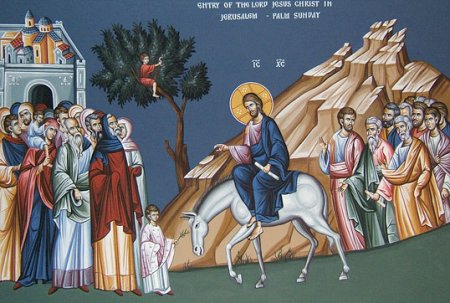Sermon for the Last Sunday after Pentecost, Proper 29A, preached on Sunday, November 20, 2011.
So now we come to the end of the Church Year. We went through the preparation of Advent to the celebration of Christmas to the revelation of Epiphany to the repentance of Lent to the rejoicing of Easter to the awe of Pentecost to the mystery of the Trinity to the lessons of the long, green season of Sundays after Pentecost. And now it has come to an end. The lessons now speak to us today of something many of us dread or dread talking about – judgment. We would rather celebrate; heck, we would even rather repent than ponder God's judgment of our lives. Yet, this judgment cannot be avoided. Yet as we reflect upon the words of Jesus in the Gospel, we are reminded that we meet this judgment from the perspective of faith and confidence and not fear and doubt.
Do you remember Thomas and how he saw so clearly his doubts and fears? Because he saw what he was afraid of and what he doubted so clearly, he could not see Jesus. We run the same risk. If we live out our lives seeing through the eyes of our fears and doubts, we will miss what is most certain and sure. But if we look at things through the lens of faith, we will see what is most true and sure. What distinguishes those who receive the surprise of grace from those who receive condemnation is this perspective of faith. Truly Jesus does not speak of some simple external judgment of deeds. The righteous and unrighteous are separated not merely by their deeds but primarily by the heart from which these deeds proceed.
The unrighteous understood seeing is believing. If they had seen Jesus they would have fed Him, given Him drink, welcomed Him, clothed Him, and visited Him. They did not see Jesus. They never saw Jesus in the whole of their lives. They were too busy trying to figure out who was legit, who was scamming them, who was honest and who was lying, who was worthy of their love and who was unworthy of their attention. They thought their best service to God and to themselves was to judge. So they spent their lives judging by what their eyes could see.
If they had seen Jesus, they would have acted differently. Because they did not see Jesus they were surprised that they were held accountable for the way they treated those in need. They saw the needy as a burden. They saw their own need as greater than the needs of others. Charity begins at home, you know. They saw people trying to get what was theirs, what they had worked for, and what they had earned the right to call their own. They saw people inconveniencing them with their needs, with their timing, and with their demand for attention. But they did not see Jesus. Because they did not look through the lens of their faith, they saw only what their eyes could see. Nothing more...
In contrast to that, the righteous are those who saw everything through the lens of faith. It is not that they saw or recognized Jesus in the face of the poor or needy. No, they too were surprised when Jesus pointed out what they had done for him. They did not see Jesus in one place but they saw Him everywhere. They considered themselves the hungry, wounded, sick, imprisoned, naked, and alien for whom the Lord became their brother in flesh and their Savior in death. Their whole lives were lived in response to the love that came for them and their need. They marveled how He had suffered and died for them – unworthy, undeserving, and unlovable though they were. They saw the cross everywhere they looked and their hearts were moved by the vision of the love that had come for them. So from this love, they learned to love others, to care for those in need, to take on the burdens of others, and to inconvenience themselves for a people unworthy and undeserving of their time, effort, or material gifts.
They did not ask Jesus where He was because if they had seen Him, they might have acted differently. No, they asked Jesus where He was because they saw nothing in their hearts or lives that should single them out for honor or notice. They saw themselves as the recipients of His grace and favor and so they could not help but be open to those around them, who, like them, were hurting or needy. The problem was not that some saw Jesus and others did not. The problem was that the righteous saw themselves as the poor and needy for whom Christ came and unrighteous saw themselves as deserving and worthy of everything they got.
And that is where we come today, at the end of one year of grace and the start of a new one. Do you see Jesus? I don't mean do you see Him here or there but do you see everywhere by faith? Do you see yourselves as the poor and needy for whom Christ came? For it is only when we see this that we are equipped and prepared to extend Christ’s love to those around us.
The righteous in Jesus' story did not merely see needs. They saw the resources God has supplied to them. They saw grace all around them. They saw the abundance of God's blessings so they could not but share with those in need. Faith directed their vision. The righteous in Jesus' story did not see the wounded and hurting as problems to be solved or responsibilities to be fulfilled. They remembered the wounds and hurts that Jesus bore for them on the cross. Their vision was so shaped by their awareness of what Jesus bore for them, that they could not but bear with those in need – whoever they were. They could not but act in kindness because the kindness of God moved them.
The righteous in Jesus' story saw through eyes of faith all that God in His grace had done for them. And this grace spilled out and over and into their lives. They were not moved by worthy causes or legitimate needs or sob stories. They were moved by the love of God planted in their hearts. Mercy was not their duty, it was their privilege – all because of the mercy that first found them and now found others through them.
Now you might think that this was a pep talk from Jesus about how we should care for our brothers and sisters and neighbors in need. But it is nothing of the sort. Jesus is calling us to see our whole lives through the lens of the cross, from the vantage point of faith. For it is then and only then that good works well up and spill out into the whole of our lives.
We as Christians are too likely to tell God that if we see a real need, we will respond. If we are convinced that we can do something, we will do something. But God is not looking for people who see the difference between the worthy and the unworthy, the real needy and the scammers. God is looking for people who have received His grace and who respond with grace, who have received His mercy and who show forth that mercy, who have known His kindness and who act kindly. This is not about good works that are forced or motivated by guilt or fear. This is the story of a people so impressed with the mercy of God toward them that they act in mercy toward others. This is about believing that is seeing, faith to see Jesus everywhere.
Today we pray not that we might be more generous or accepting or even caring. Today we pray for faith to see us as the wounded and weak for whom Christ came. Then we will see and know what opportunity God gives us when we see another in the same need as we have. And then we will know how to respond – with the grace and mercy of our Savior. Amen.




















